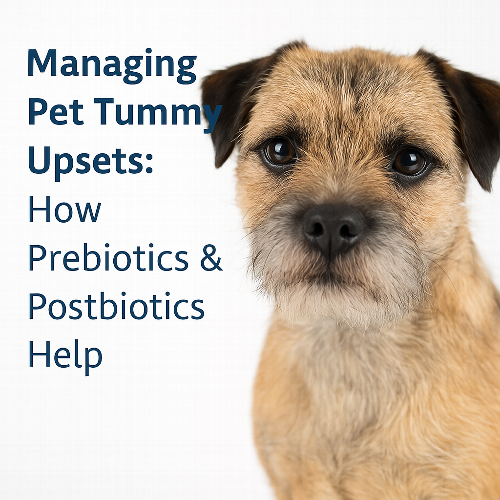Managing Your Pet's Tummy: Prebiotics, Postbiotics & Flexible Care | Samaxia
Managing Your Pet's Tummy: Prebiotics, Postbiotics & Flexible Care
A simple, veterinary-accurate guide to supporting digestive comfort in dogs and cats—especially after they've eaten something unusual or experienced a stressful day.
Why the gut matters
The digestive tract is home to the intestinal microbiota—billions of micro-organisms that help process food and support natural defences. When this balance is disrupted, pets may show temporary signs such as loose stools, excess gas, or changes in appetite.
Prebiotics & postbiotics—made simple
Prebiotics
Specific fibres that are selectively used by beneficial bacteria in the gut—think of them as nourishment for a healthy microbiota.
Postbiotics
Preparations of inactivated micro-organisms and/or their components. Even without live bacteria, they can help maintain a comfortable gut environment.
These definitions align with widely accepted scientific guidance and are suitable for everyday pet-owner understanding.
Flexible, easy-to-give options really help
Giving any supplement can be tricky—especially with fussy cats or sensitive dogs. Choosing flexible formats makes life easier and improves consistency. Look for options you can give as a capsule, open and sprinkle over food, or mix into a paste or small amount of liquid. Palatability matters too.
What to look for in a digestive support product
- Ingredients commonly used to adsorb or absorb unwanted gases, liquids and impurities (e.g., montmorillonite clay, vegetable charcoal).
- Nature-derived plant ingredients such as carob or blueberry.
- Sources of prebiotics (e.g., brewer's yeast products) and the addition of postbiotics to help maintain the natural balance of intestinal flora.
- Clear, easy dosing and owner-friendly formats (capsule, sprinkle, mix).
For example, products such as Ultradiar® combine several of these ingredient types in flexible formats that are easy for owners to give. Always speak with your vet for tailored advice.
Note: the above are examples of commonly used ingredients in non-medicinal digestive support products. They support comfort and normal gut balance and are not a substitute for veterinary diagnosis or treatment.
Common triggers for temporary tummy upsets
- Eating something unusual on a walk or in the garden
- Sudden diet change or rich treats
- Stressful events—travel, new environments, fireworks, visitors
- Minor routine changes that unsettle sensitive pets
Alongside rest, access to fresh water and your vet's advice, supporting the gut with pre- and postbiotics can be helpful during these short-term wobbles.
Next steps
- If your pet seems unwell, contact your veterinary practice.
- For mild, short-lived tummy upsets, speak to your vet about non-medicinal digestive support with pre- and postbiotics.
- Learn more about Ultradiar® in our shop
Important: Products discussed here are non-medicinal supports for digestive comfort and balance. Always follow your vet's guidance.
Flexible digestive support options
For pet owners who want an easy-to-give, non-medicinal option to help support digestive comfort, Ultradiar® is available through veterinary practices and online pharmacies.
Ultradiar® combines carefully selected ingredients including:
- Montmorillonite & vegetable charcoal – widely used for their ability to adsorb and absorb unwanted gases and liquids
- Carob & blueberry powders – nature-derived ingredients with recognised digestive properties
- Brewer's yeast (a source of prebiotics) & postbiotics – to help maintain the natural balance of intestinal flora
Easy administration
- Given whole as a capsule
- Opened and sprinkled over food
- Mixed into a paste or small amount of liquid
This flexibility makes it easier for owners to give and more acceptable for pets.
Learn more about Ultradiar® in our shop
Important: If your pet's digestive signs are ongoing, severe, or accompanied by other changes such as vomiting, lethargy, or blood in the stools, consult your vet promptly.
When to see a vet urgently
- Blood in stools, repeated vomiting, marked lethargy, abdominal pain
- Puppies, kittens, elderly pets, or those with existing conditions
- Signs persisting beyond 24–48 hours



